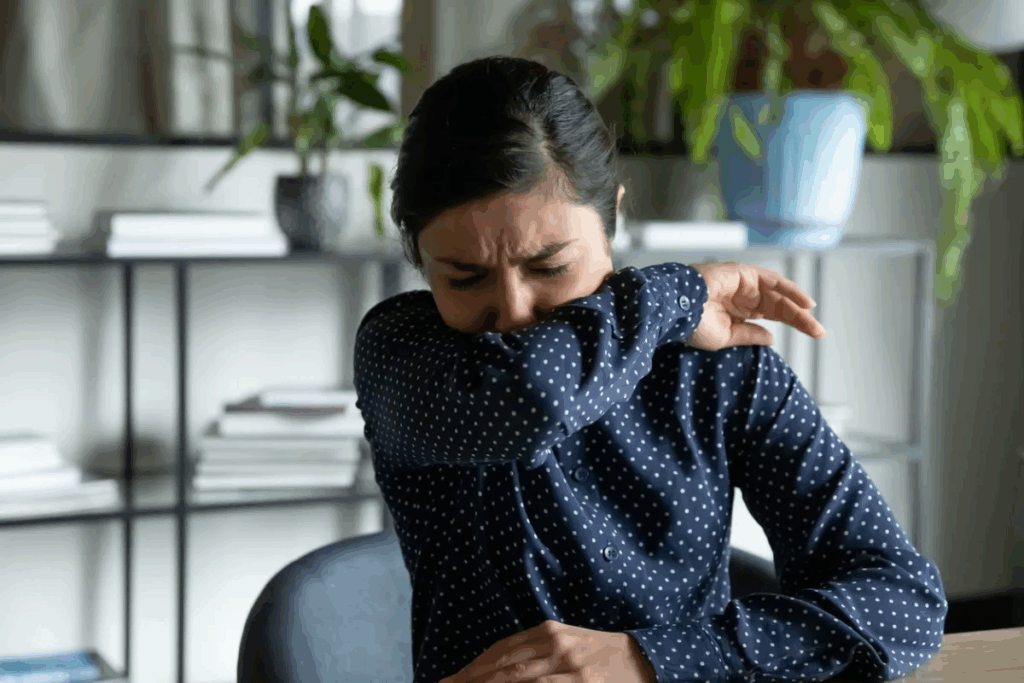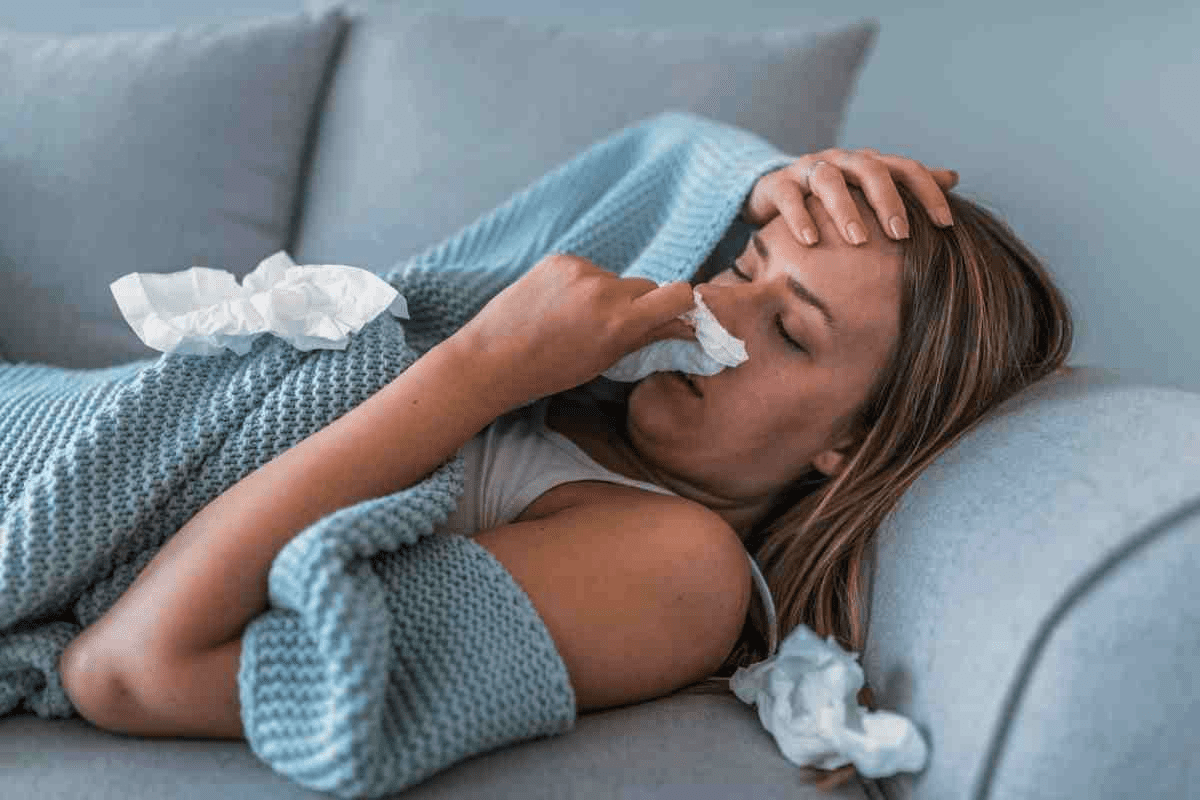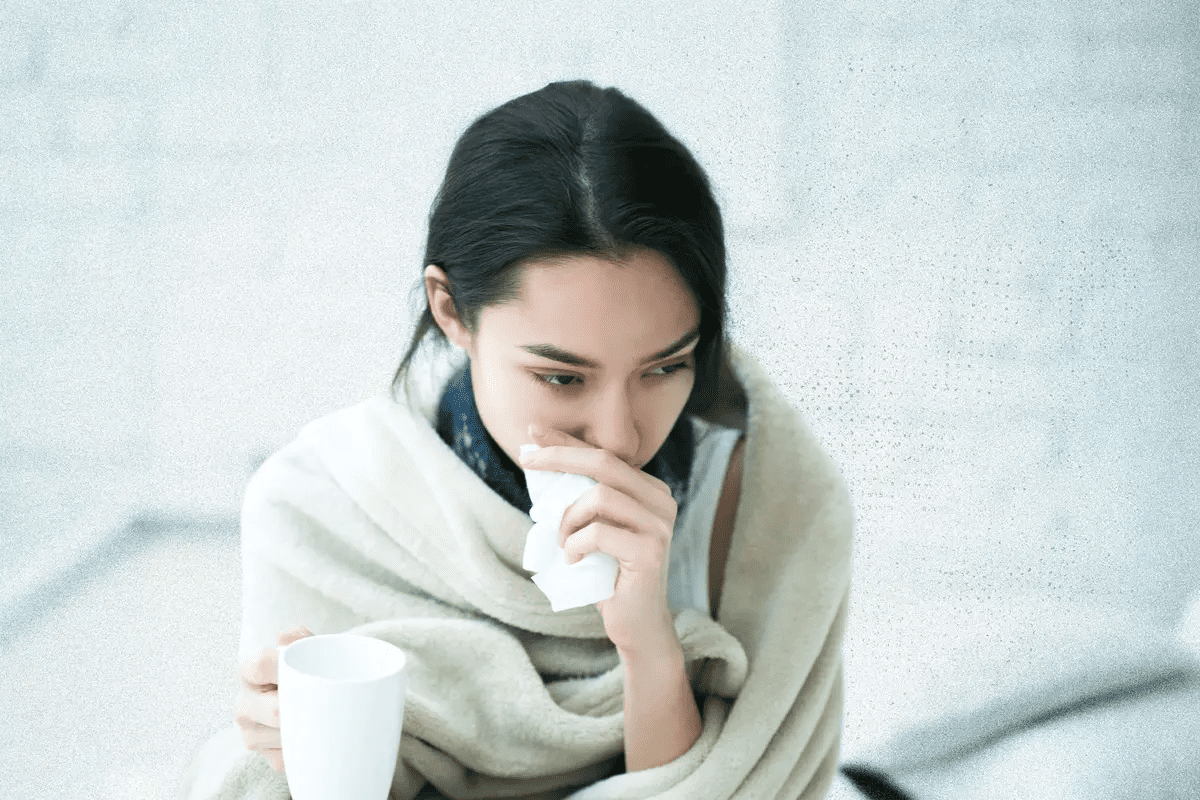Last Updated on October 31, 2025 by Saadet Demir

Feeling chills and night sweats with nasal congestion and sinus pressure can be scary. These signs might mean your body is fighting a sinus infection. It’s important to know how sinusitis and these symptoms are linked for the right treatment.
At Liv Hospital, we use the latest medical knowledge to help our patients. We know that sinus problems affect over 29 million Americans every year. This shows how big of a health issue sinusitis is.
We understand that sinus infections can lead to symptoms like chills and sweating. Our team is here to offer caring and complete treatment to help you get better.
Sinus infection chills: Learn why a severe sinus infection can cause systemic symptoms like chills, night sweats, and body aches due to the body’s inflammatory response.

Sinusitis, or sinus infection, is when the sinus tissue lining gets inflamed or swollen. It can really affect someone’s life, causing a lot of discomfort. We’ll look into why sinusitis happens, how it develops, and how common it is.
Sinusitis happens when the sinuses, air-filled spaces in the facial bones, get inflamed or infected. This can be due to viruses, bacteria, or fungi. It often starts when the sinuses can’t drain properly, causing mucus to build up and infections to spread.
The sinuses have a mucous membrane that traps dust, bacteria, and other harmful stuff. Normally, this mucus drains out. But when the sinuses get inflamed, this drainage stops. This leads to mucus buildup and sinusitis.
Sinusitis can be caused by many things, like viruses, bacteria, or fungi. Allergies, environmental factors, and even the shape of the nasal passages can play a role. Knowing what causes it helps in preventing and treating it.
In the United States, sinusitis affects about 29 million people every year. This shows how big of a health issue it is. Knowing the signs and symptoms early can help get the right treatment and avoid serious problems.
Sinusitis is more than just a minor issue; it’s a serious health problem that needs attention. By understanding its causes and how common it is, we can see why we need good treatments and ways to prevent it.

Sinus infections show up in many ways, affecting how well you feel every day. Knowing these signs is key to getting the right treatment.
Local symptoms happen in the nose and sinuses. They include:
These symptoms come from the sinuses getting inflamed and infected. They cause pain and discomfort in the face.
Sinus infections also have systemic symptoms. These affect your whole body. They include:
These symptoms happen when your body fights off the infection. They make you feel sick all over.
Symptom Category | Common Symptoms |
Local Symptoms | Nasal congestion, facial pressure, nasal discharge |
Systemic Symptoms | Fatigue, fever, malaise |
It’s important to notice both local and systemic symptoms. This helps doctors diagnose sinus infections correctly and treat them properly.
Sinus infections can make your body temperature change. This is key to understanding why you might feel feverish, get chills, or sweat a lot at night.
When you get a sinus infection, your body starts to fight it. This fight involves your immune system and can make your temperature go up.
This increase in temperature is called fever. It’s a natural defense that makes it harder for the infection to spread.
Your body has a system to keep its temperature stable. This system is controlled by the hypothalamus, like a thermostat. When you get sick, this system changes.
The immune system sends signals to the hypothalamus. This makes your body try to get hotter. You might feel cold because of this, but it’s your body’s way of fighting off the infection. When you get better, your body temperature goes back to normal, and you might sweat a lot at night.
Immune Response Component | Role in Infection | Effect on Body Temperature |
Cytokines (e.g., IL-1, TNF-alpha) | Activate immune cells and induce inflammation | Increase the body’s temperature set point, leading to fever |
Hypothalamus | Regulates body temperature | Adjusts temperature set point based on immune signals |
Shivering | Generates heat | Raises body temperature to the new set point |
Sweating | Dissipates heat | Reduces body temperature when the infection subsides |
Knowing how sinus infections affect your body temperature is important. It helps you understand why you might feel feverish or sweaty at night. It also shows why treating these symptoms is part of fighting off the infection.
Chills during a sinus infection show the body’s fight against the infection. It’s a sign that the body is trying to get warmer to fight off the infection.
Chills happen when an infection is in the body. When something like bacteria or a virus gets into the sinuses, the body’s immune system kicks in. The brain’s part that controls temperature, the hypothalamus, makes the body warmer.
This makes the body shiver or feel cold. This is important because it makes it harder for the infection to grow.
When fever starts, the body changes to fight the infection. The hypothalamus makes substances that cause fever. Even if the body feels cold, it’s actually getting warmer. This cold feeling is because the body is trying to keep its core warm.
Bacterial sinusitis often causes sinus infections that lead to chills. When bacteria infect the sinuses, they release toxins. This makes the body’s immune system work hard, leading to fever and chills. Bacteria in the sinuses can cause a more serious infection, leading to higher fever and more chills.
Bacterial sinusitis can cause a strong immune response. This can lead to symptoms like chills, fever, and stuffy nose quickly. Knowing how bacterial sinusitis causes chills is key for proper treatment.
When sinus infections hit, night sweats can be a big problem. They mess up your sleep and make you feel tired and uncomfortable.
Sweating helps the body fight off infections by keeping it cool. When you get a sinus infection, your immune system kicks in. This leads to chemicals and cytokines being released, raising your body temperature.
The process involves several key steps:
Sweating gets worse at night for a few reasons. Your body’s natural rhythm affects hormone release, which can raise your temperature. Also, your body can’t cool itself as well when you’re asleep, making you sweat more.
“Night sweats can be a significant symptom that indicates the body is fighting an infection,” showing why it’s key to understand and manage this symptom.
To fight night sweats from sinus infections, you need to tackle the infection itself. This might mean antibiotics or home remedies to ease symptoms and help you sleep better.
Sinus infections can have different symptoms based on their cause. Knowing these differences helps in choosing the right treatment and managing symptoms well.
Viral sinusitis is the most common type of sinus infection. It’s usually caused by viruses that also cause the common cold. Symptoms like nasal congestion, discharge, and facial pressure can appear within a few days. It usually gets better on its own within 7-10 days.
A medical expert notes, “Viral sinusitis is often self-limiting, meaning it will resolve without specific treatment.”
“Most cases of viral sinusitis are managed with supportive care, such as nasal decongestants and pain relievers.”
Bacterial sinusitis lasts longer than 7-10 days and can cause severe symptoms. It’s marked by persistent or worsening symptoms like thick nasal discharge, facial pain, and fever. We use the 7-10 day threshold to tell viral from bacterial sinusitis.
Characteristics | Viral Sinusitis | Bacterial Sinusitis |
Duration | Typically resolves within 7-10 days | Lasts longer than 7-10 days |
Symptoms | Nasal congestion, discharge, facial pressure | Thick nasal discharge, facial pain, fever |
Treatment | Supportive care (decongestants, pain relievers) | Antibiotics may be prescribed |
Bacterial sinusitis often causes chills and night sweats because of the body’s immune response. When bacteria infect the sinuses, the body gets inflamed. This can lead to fever, chills, and sweating. These symptoms show a more serious infection that might need medical help.
It’s key to tell apart bacterial and viral sinus infections to give the right care and treatment. By knowing the symptom differences and durations, we can better handle sinusitis and lower the risk of complications.
Diagnosing sinusitis with systemic symptoms needs a detailed medical check-up. Symptoms like fever, chills, and night sweats show a serious infection. This calls for a careful look.
We start by taking a detailed medical history. We focus on how long and how bad the symptoms are. This helps us tell if it’s acute or chronic sinusitis.
A physical exam is also key. We check for sinus tenderness, nasal congestion, and other symptoms.
Assessing systemic symptoms is part of the process. Chills and night sweats, for example, suggest a bacterial infection. This might need antibiotics.
To confirm the diagnosis, we use different tests. Imaging studies, like CT scans, help see the sinuses. They show any problems or abnormalities.
Nasal endoscopy is also useful. It lets us see the nasal passages and sinuses directly. This helps spot infections or inflammation.
It’s important to rule out other conditions that might look like sinusitis. This includes allergies, respiratory infections, and other diseases with similar symptoms.
We use medical history, physical exams, and tests to do this. Differential diagnosis is key to treat the right condition.
If you have sinusitis with chills, it’s important to know when to get medical help. Sinus infections can sometimes get very serious. Knowing when to seek help is key.
Some symptoms mean your sinusitis is getting worse or causing serious problems. Look out for:
Telling if you’re getting better from sinusitis or facing complications can be tricky. If your symptoms start to get better in 7-10 days, you’re likely on the mend. But if they get worse or don’t get better, it might be a sign of a complication.
Some signs of complications include:
Sometimes, sinusitis can lead to serious problems that need immediate care. If you or someone you’re with has any of these symptoms, go to the emergency room or call emergency services:
Knowing these warning signs and when to get medical help can greatly improve your recovery and health. If you’re unsure about your symptoms or have concerns about your sinusitis, always talk to a healthcare professional.
Treating sinus infections with systemic symptoms requires a mix of medical care and home remedies. Symptoms like fever, chills, and night sweats need attention. It’s important to treat the sinus infection and its body-wide effects.
For bacterial sinusitis, antibiotics are often prescribed. The right antibiotic depends on the infection’s severity, the patient’s health history, and local resistance. Other medicines may also be used to ease symptoms. For example, decongestants can help relieve nasal congestion, and pain relievers like acetaminophen or ibuprofen can reduce fever and ease headaches.
“The judicious use of antibiotics is critical in treating bacterial sinusitis effectively while avoiding antibiotic resistance.”
Managing systemic symptoms at home is key. To fight fever and chills, drink lots of fluids. Over-the-counter medicines like acetaminophen or ibuprofen can help lower fever. For night sweats, keep your bedroom cool and wear light clothes. Getting enough rest is also important for recovery.
The recovery time for sinus infections with systemic symptoms varies. Patients usually start feeling better a few days after starting antibiotics. It’s vital to finish all antibiotics to clear the infection. Symptoms like fever and chills usually go away in a week, but some might feel tired longer.
Understanding treatment options helps patients manage their recovery. Knowing when to seek more medical help is also important if symptoms don’t improve or get worse.
Sinus infections can cause symptoms like chills and night sweats, mainly if they are bacterial. We’ve looked into how sinusitis, a common issue, can lead to these symptoms. It’s key to understand how sinus infections affect our body’s temperature.
If you’re feeling chills and night sweats from a sinus infection, see a doctor if it doesn’t get better. The right treatment can help ease these symptoms and stop them from getting worse. Getting medical help early can help you feel better faster.
It’s vital to get a proper diagnosis and treatment for sinus infections and their symptoms. The right approach can help you beat these conditions and get back to good health.
Yes, sinus infections can cause chills and night sweats. This is more common in bacterial sinusitis.
Sinusitis is when the sinus passages get inflamed or infected. It happens when the sinuses get blocked. This lets bacteria or viruses multiply and cause infection.
Sinus infections are very common. Over 29 million Americans get them every year.
Symptoms include congestion, pressure, and discharge. You might also feel tired, have a fever, and feel generally unwell.
When the body finds an infection, it starts an immune response. This can affect how the body regulates temperature, leading to fever.
Chills happen as the body tries to raise its temperature to fight the infection. This makes you feel cold.
Sweating increases during sleep because the body’s temperature control can be off. This is how the body tries to cool down.
Bacterial sinus infections are more severe and last longer. They are more likely to cause chills and night sweats.
Doctors use a medical evaluation and tests like imaging studies or nasal endoscopy. This confirms sinusitis and rules out other conditions.
See a doctor right away if you have severe symptoms like high fever, severe headache, or trouble breathing. Also, if your symptoms get worse over time.
Treatment includes antibiotics for bacterial infections. You might also need medications for fever and chills. Home management strategies are also important.
Yes, sinus infections can cause sweating, including night sweats. This is part of the body’s response to infection.
Recovery time varies. Most people get better in a few days to a couple of weeks with the right treatment.
Night sweats can happen, but it’s more common in severe cases or with bacterial sinusitis.
It’s less common, but possible. A sinus infection can cause chills without a high fever, often at the start of the infection.
Subscribe to our e-newsletter to stay informed about the latest innovations in the world of health and exclusive offers!